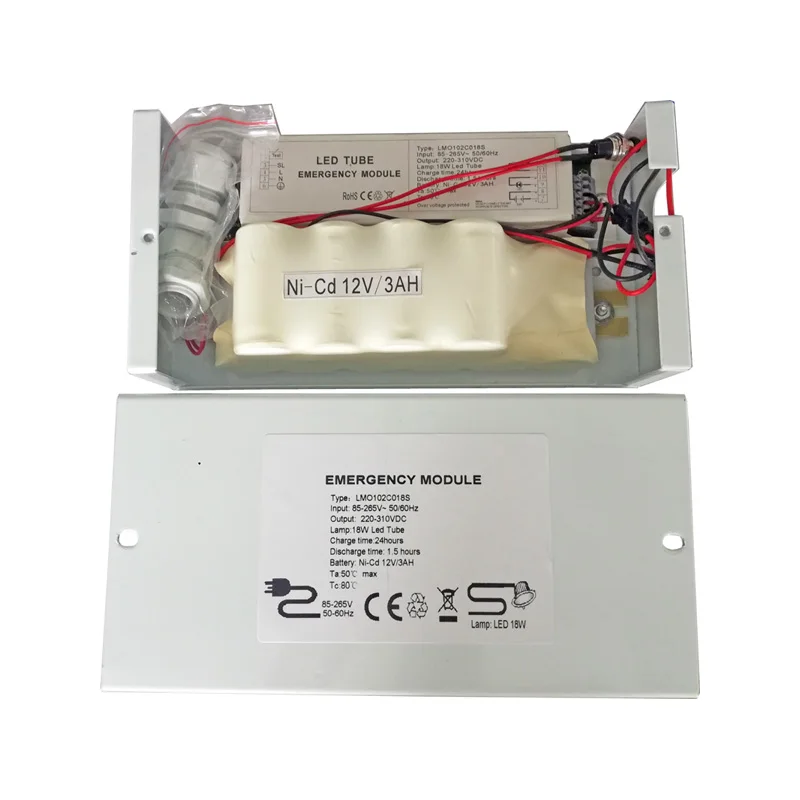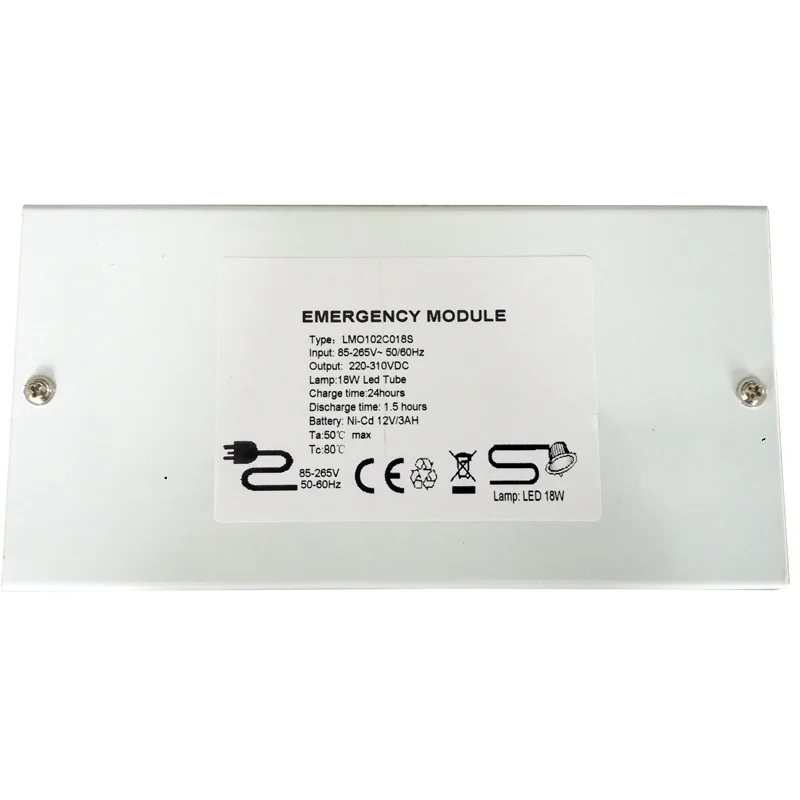
| Model No. | LMO102C030S |
| Product Name | Full power rechargeable emergency module |
| Battery Type | NiMH, NiCd |
| Lighting Power | 18WLED |
| Emergency Power | 18W |
| Input voltage | AC110~220V, 50/60Hz |
| Battery protection | Yes |
| Operation temperature | -20--70℃ , 65+20% RH |
| Highest Surface Temperature | 50°C |
| Battery Capacity | 12V 3000mAh Rechargeable Nicd battery pack |
| Charging Time | >24h without break |
| Output Voltage in emergency | 220-320VDC |
| Suitable light source | LED |
| Emergency power | 100% |
| Emergency duration | 90minutes |
| Product Weight | 1.8kgs |
| Inverter dimension | 180*40*30mm |
| Standard |
complies with EN 60598, ICEL1001, ICEL1010 With CE and RoHS certificates |
| Note | Custom-Made battery to be configured with different back-up period and different light output levels. |
Description
Sanforce full power emergency conversion kits allow the LED fixtures to meet requirement for emergency illumination level same as mains supply.
The converter automatically adjusts the output LED current and keeps Fixed Voltage output to provide the best match between the battery and the load, providing maximum illumination whilst ensuring full battery duration.
The product range to cover a variety of LED fixture ideal for high voltage board(220-310V DC)LED tube, Led Sensor tube and Tri-proof tube...etc with internal LED driver.
Features
- IC controlled Dual rate Charger for energy savings.
- Short circuit protection at battery terminals.
- Battery reverse protection functionality
- Charge indicator and test button. The light fittings guarantee safety of people in buildings open to the general public.
- Automatically actuated in the event of power cuts, these devices (kit + light fitting) offer a good luminous flux to facilitate the evacuation.
- Comply with European standards EN 61 347-2-7 and offer a high level of quality and safety meeting the various prevailing regulations.
- Full emergency output ,Dial the code to suitable current of luminaires.










1 Are there any recommended testing procedures for Sanforce LED Emergency Drivers?
Press the test button to cut the power to the AC driver and switch the system to Emergency Mode. Release the test button to return to Normal Mode. Switch off the circuit breaker to simulate a full power outage. For Initial Testing, allow the unit to charge approximately one hour, and then conduct a short discharge test. Allow 24 hour charge before conducting a one hour test
2 Is there a shelf life to the batteries?
Sanforce emergency drivers include NiCAD batteries. Nickel Cadmium batteries can be stored in either a charged or discharged state. However, long term storage can accelerate battery self-discharge, and lead to the deactivation of reactants. Although the cells can be stored at temperatures between -20°C and +45°C, as with almost all batteries heat can cause deterioration of the active chemicals and it is better to keep the cells in a cool, clean, dry, non-corrosive environment. After prolonged storage, two or three deep discharge cycles may be needed to restore full capacity. When storing for periods longer than a year or two, some performance decay can occur – NiCAD batteries that are on a shelf for longer than a year should be subjected to deep discharge/charge cycle to prevent this decay.
3 It need be charged for the first time usage after installation?
Yes, the battery packs must be charged over 24 hours after installation
4 Can EM kit work with any kinds of lights?
No, we have different EM kit for different lamps, please reference to " How to choose the right emergency battery packs".
5 How to know you choose high temperature battery or regular temperature battery?
The high temperature battery can be trickle charged well even if the emergency kit is in high temperature due to insufficient radiating caused by the lights working for long time. While regular temperature battery stop charging in high temperature that result in emergency light failed to work. We recommend to use high temperature battery for EM kit.
6 Are the emergency modules with over charging protection and discharging protection?
The battery is being charge all along when mains is working, and the charging current will be decreased based on the capacity status of battery packs during charging. When battery pack is changing enough, the charging current is very small, and need not over voltage protection, but on discharging operation the emergency module set a cutting voltage to protect over discharging.
7 How EM kit work?
When the normal supply of AC power fails, the emergency kit senses the power failure and immediately switches to the emergency mode to illuminate lamps. When AC power is restored, the emergency ballast returns to the charging mode until the next power failure or emergency situation. The battery fully recharges within 24 hours.
8 Should the Sanforce LED Emergency Driver have the test switch wired on Line or Neutral?
The test switch can technically be installed on either Line OR Neutral. Neutral is more convenient for most customers for installation purposes depending on where they want to install the test switch. If wired on Line the test switch is sometimes limited to where it can be installed depending on how the building’s electrical wiring is configured.
9 I am an OEM and I have a 9W LED fixture, can I use a 12W Sanforce LED Emergency Driver?
You must make sure that the emergency driver characteristics match those of the fixture it is intended for installation with. A) The fixture must have an output power equal to or greater than the intended emergency driver. B) The fixture’s LED Load must have an output voltage at same range of both LED fixture.






